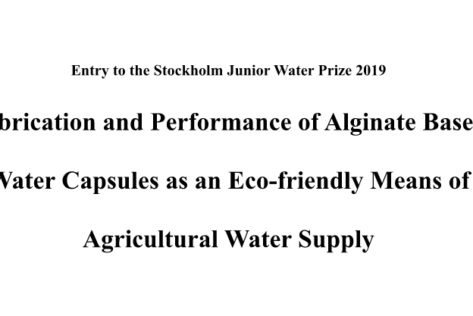PERSPECTIVES

This study is focused on developing a water capsule to tackle drought, decreasing the water wasted from agriculture. By burying small capsules that steadily eject water near the roots, the immense amount of water that evaporates after being sprayed on crops can be saved. This study first discusses the method of fabricating sphere-shaped alginate capsules, involving ice balls. Alginate is a polymer that can form membranes by cross-linking with divalent cations. Then it determines the ideal composition and concentration of the alginate membrane using Young’s modulus comparisons to measure the stiffness. Experiments were conducted to measure the discharged water over time for each type of capsule.
This is how I came up with the idea for this project:Increased heating from global warming has increased the chances of quicker and more intense droughts globally.[1] Korea is no exception, with droughts every year since 2012 and a record-high 39,826 hectares of arid land in 2016, more than 5 times that of 2015.[2] Agriculture, which accounts for approximately 70% of the total freshwater usage according to the Food and Agriculture Organization of the United Nations, is largely affected by intense droughts. With these issues at hand, conserving water resources and increasing water efficiency is urgent. While current methods of conservation in agriculture, such as drip irrigation techniques, contribute to some reduction in water waste, they are costly in installation and maintenance. Drip irrigation tubes often clog, making expensive repairs and filtration systems necessary. Also, plastic tubes heated by sunlight could release harmful materials into the ground, polluting the soil. An affordable and eco-friendly alternative to manage water efficiency in temporary droughts is necessary.

Programme manager ania.andersch@siwi.org +46 8 121 360 59